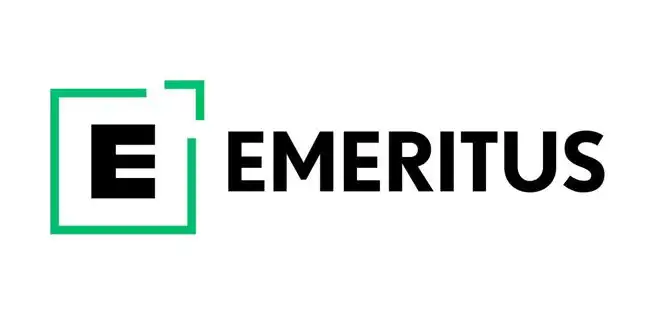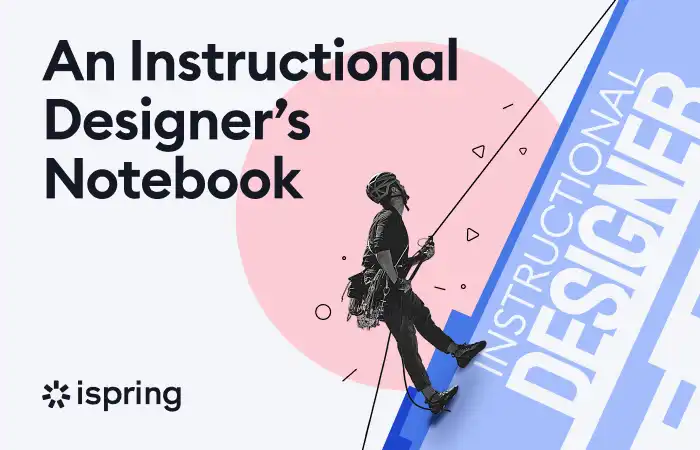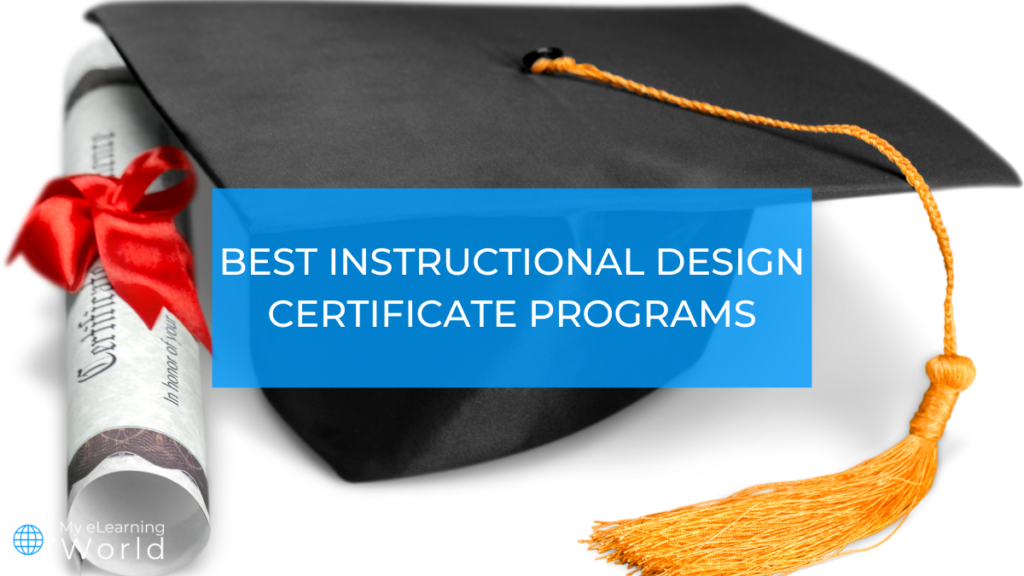The field of instructional design has grown fast in recent years, and the demand for qualified instructional designers is expected to continue rising in the coming years. In fact, the Bureau of Labor Statistics projects an overall 11 percent increase in ID positions in 2026 compared to 2016.
To help meet this demand, there are dozens of schools in the US providing web-based Instructional Design (ID) Certification, which helps you get on the right track in the development of engaging e-Learning courses and curriculums. Whatever your goals, be it upskilling, improving your instructional design resume, mastering the main ID models, or merely obtaining relevant credentials to break into the field, these programs will dive into the theory and practice of instruction adjusted to the Web 3.0 reality, and modern teaching techniques.
I stand as a living proof of the effectiveness of instructional design certificate programs. Two decades ago, the emergence of eLearning technology piqued my interest. Since then, I’ve enrolled in numerous online courses, certificate programs, webinars, and virtual training sessions to deepen my understanding and skills in the domain.
I’ve reviewed and ranked the best online certificate programs for instructional designers based on a variety of important factors, including cost, instructor credentials, school reputation, student satisfaction, and career outcomes (click here to learn about our entire Editorial Process & Methodology for these reviews).
Our Top Pick
 Emeritus Professional Instructional Design Certificate | Online Certificate Course
Emeritus Professional Instructional Design Certificate | Online Certificate Course
Gain firsthand expertise in instructional design principles and methodologies through this unique Professional Certificate program. Create impactful learning solutions and improve people's ability to learn.
If you’re looking to take your career in instructional design to the next level, the Professional Certificate in Instructional Design from Emeritus is an option I think is worth considering.
In just five months, you’ll gain a wealth of knowledge and expertise, equipping you to stand out from the competition and launch your career as a professional instructional designer.
With experienced instructors teaching industry-relevant topics, you’ll develop valuable insights into analytics and methodologies, enabling you to create insightful learning solutions that truly make a difference for your students or colleagues.
The Professional Certificate in Instructional Design program provides a comprehensive education in all aspects of instructional design, from utilizing technology in the classroom to creating bespoke training programs for businesses and other educational settings.
This course is a fantastic option for someone looking to amplify their skills and transition into the field of instructional design.
One of the things that I think stands out about this program is how it allows students to cultivate relationships with colleagues and clients while gaining the experience and knowledge needed to succeed in this growing industry. As an Emeritus student, you not only benefit from this high-quality course, but you also become part of a supportive and interconnected community focused on collective growth and success. With opportunities to share insights and resources, the learning experience is enriched, and collaboration is encouraged.
Click here to learn more about the program and request a free brochure.
What are the Best Instructional Designer Certificate Programs Online?
For your convenience, I’ve compiled a table of the 27 most promising ID certificate programs. Check out the details below.
| Organization | Course name | Credits | Total cost and duration |
| Best Choice:Emeritus | Professional Certificate in Instructional Design (Emeritus) | Upon request | $3,500; 5 months |
| iSpring Solutions | Upon request | $570; 3 hours | |
| University of Illinois at Urbana-Champaign, Online (Coursera) | Upon request | $59/month; 19 hours | |
| University of Illinois at Urbana-Champaign, Online (Coursera) | Upon request | $59/month; 14 hours | |
| University of Illinois at Urbana-Champaign, Online (Coursera) | Upon request | $59/month; 7 hours | |
|
University of Illinois at Urbana-Champaign, Online (Coursera) |
Upon request | $59/month; 13 hours | |
| Harvard University Cambridge, Massachusetts |
Learning Design and Technology Certificate | 16 | $12,400; 1.5 years |
| UCI Division of Continuing Education Irvine, California |
E-Learning Instructional Design | 15 | Upon request |
| University of Massachusetts Boston Boston, Massachusetts |
Instructional Technology Design | 15 | $8,625; 9 months |
| University of Georgia Athens, Georgia |
Graduate Certificate eLearning Design | 15 | $9,435; 12 months |
| University of Washington Seattle, Washington |
E-Learning design & development | Upon request | $4,250; 6–8 months |
| University of California Oakland, California |
Teaching Online Certificate | 13 | $1,705; 6–9 months |
| UHM College of Education Honolulu, Hawaii |
GCERT Learning Design and Technology: Online Learning and Teaching | 15 | 12 months, price upon request |
| University of North Carolina Wilmington, Wilmington, North Carolina | ITS/TF Certificate Program | 18 | Upon request |
| Boise State University Boise, Idaho |
Workplace Instructional Design | 18 | $9,705; duration upon request |
| Florida State University Tallahassee, Florida |
Instructional Design and Technology | 15 | Upon request |
| The George Washington University Washington, D.C. |
Graduate Certificate in Instructional Design | Upon request | Upon request |
| Graduate School of Education and Human Development Washington, D.C. |
Graduate Certificate in Instructional Design | 18 | Upon request |
| Indiana University Bloomington Bloomington, Indiana |
Instructional Systems Technology | 15 | Upon request |
| University of Wisconsin-Stout Menomonie, Wisconsin |
Online Instructional Design Graduate Certificate | Upon request | $5,712; 9 months |
| Walden University Minneapolis, Minnesota |
Post-Baccalaureate Certificate in Instructional Design and Technology | 12 | $7,940; duration upon request |
| Georgia State University Atlanta, Georgia |
Instructional Design and Technology | 12 | Upon request |
| Bloomsburg University of Pennsylvania Bloomsburg, Pennsylvania |
eLearning Specialist Certificate | 12 | Upon request |
| American Military University Charles Town, West Virginia |
Instructional Design and Delivery | 18 | $5,850; 1 year |
| Drexel University Online Philadelphia, Pennsylvania |
Graduate Certificate in Instructional Design | 27 | Upon request; 4 months |
| George Mason University Fairfax, Virginia |
E-Learning Graduate Certificate | 15 | Upon request |
| University of Texas Rio Grande Valley Brownsville, Edinburg, Harlingen, McAllen, Rio Grande City, South Padre Island, Texas |
E-Learning Graduate Certificate | 15 | $5,500 in total; 14 weeks |
As you can see, there is no shortage of web-based ID programs, so how can you make the right choice?
Here is a piece of advice below.
Make up your mind: Online graduate certificate or a Master’s?
Before you actually go for an ID certificate, it makes sense to weigh the pros and cons of this option against the Master’s degree.
In most cases, your online program credits can be transferred to the Master’s, so there is no big risk in starting with the more flexible option.
Some schools even leverage e-Learning certification programs as a promotional factor with a view of ‘upselling’ the remaining credits.
Needless to say, distance learning technology courses are dramatically cheaper and they give you a taste – or even a sufficient abstract – of the complete degree course. If you like how it’s going, feel free to proceed to the Master’s.
Practice reveals that in most cases ID course attendees seek a deeper understanding of the subject and specific guidelines rather than certification as an end in itself. Given the overall positive feedback on the quality of existing web-based ID programs, instructors are happy to rely on another source of knowledge. If this also helps you get a more fulfilling job, so much the better!
Apparently, a Master’s is more of a ‘brand’; it’s something you can throw into a grant application, a brief resume, or a proposal degree and expect to reap more benefits.
Many experts believe a Master’s degree unlocks superior career opportunities for instructional designers, especially in academia. Somehow, business is deemed to be more pragmatic on the issue, discarding formal paid studies as optional and giving more weight to tangible skills and experience.
Define your goals and inclinations
Online programs are all different – some of them teach you how to deliver courses in secondary education, some target college education, others have a research slant, still others focus on creating nice-looking and logical courses.
Alternative parameters may include business/corporate vs academic, process management vs authoring, etc.
Figure out your type of instructional design degree and find the right balance between theory and practice.
Administrators, e-Learning strategists, subject matter experts, college teachers – all instructors can discover the program of their dreams with a little digging and asking.
Discern what ID methodology the program builds on
A crucial factor in studying instructional design is the theory behind it. Is this a brick-and-mortar content-driven way of building courses, or an e-Learning 4.0 concept that provides valuable insights into the future?
Does this particular design methodology factor in performance and personal pattern assessment, and does it keep the student in mind?
Go through the list of courses above and try to figure this out for yourself. Sometimes you can read in between the lines, and sometimes it pays off to ask direct questions or review the faculty’s experience and footprint on the web.
After all, these guys must’ve made some courses themselves. Be curious, but don’t get carried away with minor details.
Check out their cloud/software infrastructure
A seemingly irrelevant point, the tech organization of the process may turn into a pitfall once you get started. Does your college provide the necessary infrastructure and software (if necessary), how can you share feedback and interact with the instructor, and how can you evaluate your personal progress? Get these issues straight before jumping on board.
Last but not least: consider the bang for the buck
Program cost might not always be a determining factor, but it does influence your decision-making when signing up for instructional design courses.
Is the quote you were provided all-inclusive?
Are there any extra fees associated with the program? Software plugins, books, extra materials that you’d need to acquire on your own? Do they charge for the certificate upon successful completion the courses?
Define your budget and sign up for the best value program.
How to Find a Good Instructional Design Master’s or Certificate Program
Since there is not a good ranking system for instructional design programs, Ray Pastore has created a YouTube video that explains how to find a high-quality master’s or certificate program in instructional design.
He has earned his Ph.D. and is currently a professor who teaches courses for an instructional design master’s program.
When searching to find the perfect program, it is important to keep in mind that some master’s and certificate programs have other names such as instructional technology, learning sciences, EdTech, educational technology, digital age learning, and more.
In the video, Ray thoroughly goes over how to find the best program that matches you and your goals based on his experience, as he was once in your shoes spending his days searching for a program to attend. Although each person’s interests and goals will be different, a few of the commonly selected programs concentrate on K-12, corporate, and research.
The key focuses that Ray mentions looking at when making the important decision of choosing a program are the professors, the offering of mentorships, internship opportunities, the concentrations, projects, and hands-on work with real clients, the connectedness of alumni, the quality and design of the program’s website, and more.
He also states that it is extremely important to talk to an actual professor who teaches some of the courses in the program that you are considering instead of a marketing professional because a professor will be able to give you more factual information.
This is an excellent video for individuals considering switching careers or starting a career in instructional design.
For additional help deciding, you can check out my other articles about the best instructional design master’s programs and the best instructional design courses.
A Final Word on Instructional Design Certificate Programs
In my opinion, neither employers nor fellow trainers will judge you by your grades or certificates in e-Learning design and development. It’s the experience, attitude, and portfolio that matter.
Make sure you read prominent alumni reviews, follow their trajectories, and see if they are more or less on the same scale as your personal roadmap.
Is the knowledge obtained from your Instructional Design program applicable in the real world? That’s the pivotal question, and the answer is up to you.
And finally, if you’re working to become an instructional designer, we also highly recommend downloading your free copy of An Instructional Designer’s Notebook from the great folks at iSpring as it’s an excellent collection of resources for those starting out in the field.
 An Instructional Designer's Notebook
An Instructional Designer's Notebook
Instructional Designer’s Notebook is a free collection of the most useful guides on becoming an instructional designer and creating eLearning content to facilitate every step on your eLearning trajectory. It includes lists of ebooks, YouTube channels, blogs, tips from top experts, interactive checklists, and more.
Have any questions about finding a program to pursue a certificate in instructional design? Let us know by commenting below.



ADT would be the best choice for me. I already have my Masters degree and I’ve been building and running online courses since 2005. But as I try to break in to a career in Instructional Design, I’m up against others with a printed certificate and I don’t have one.
My question is, do you think the ATD e-learning certificate is recognized as a professional certificate equal to those obtained through accredited colleges?
Thank you in advance for your advice.
Vallarie, in my opinion, ATD is doing the right thing. From what I heard, their courses leverage the best practices in Instructional Design, including Michael Allen’s work. Plus, it’s a quick and cost-efficient way to earn an e-Learning certificate. When it comes to recognition, I have mixed feeling about this. I’ve seen people frown upon ATD and give priority to college certificate holders. On the other hand, I’ve also seen fair assessment of candidates’ skills regardless of credentials. If you are pursuing a specific position, make sure to learn about their preferences/policies in advance. Market-wise, nothing is written in stone.
I am new to discovering the career choice of ID. I have my my Master’s in Elementary Education, and have experience in instructor led applications training. I am in my 40s and so I don’t want 4 years of college again. What would be recommended ? I would like to design instruction for either the education setting or maybe non-profit sector? Not sure about the corporate setting?
I have a JD and a Master’s in Teaching in Elementary and a Middle School Endorsement in the Language Arts. I would like to do Instructional Design for the corporate world?
How do you recommend I go about doing that?
Great Post! I really appreciate your blog. You share useful content regarding instructional design process Keep up the good work!
I have a bachelors degree in secondary education with an emphasis in history. I have endorsements in Middle School History and Mathematics as well as High School Social sciences. What is the best way for me to get into ID? What are the best opportunities in academia? Business?